Professor Kyung-sup, Yoon(Department of Chemistry and Cosmetics at Jeju National University)
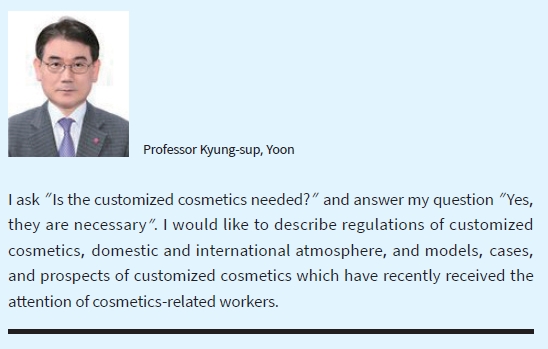
The landscape of the global beauty industry is changing (LG Economic Research Institute). Customized cosmetics, will it become a new item? (Asia Today), Why do the cosmetics industries, which have insisted on the introduction of customized cosmetics, withdraw themselves from this field? (News 1) If you read some articles as above, you can find conflicting opinions on customized cosmetics.
Nevertheless, new consumption patterns have shifted to a consumer-centered one, and most people know that consumption of customized products is the main trend. In March 2016, the Ministry of Food & Drug SafetyMFDS of Korea added the contents related to cosmetics mixing and sales in the amendments to the Enforcement Regulations of the Cosmetics Act1 and announced a safety management plan for pilot projects of customized cosmetics sales2. Its background is rapidly changing with recent social development. Especially in the field of cosmetics, the possibility of developing various and new sales methods, which have not existed in the past, is increasing due to the demand of consumers seeking individuality and diversity. Besides, in July 2017, the government decided some propositions of the Cosmetics Act for "Definition for customized cosmetics and establishment of customized cosmetics businesses" in order to meet consumer's diverse needs for cosmetics and to contribute to the development of cosmetics industry3. In this decision, the customized cosmetics was defined as 'the manufactured or imported cosmetics added/mixed with other cosmetics or ingredients prescribed by the MFDS director, or the cosmetics subdivided from the manufactured or imported cosmetics'. This includes the content of establishing the customized cosmetics sales business, which asks the person who wishes to sell customized cosmetics to report to the MFDS director.
On March 13, 2018, the definition of customized cosmetics was stipulated along with the definition of cosmetics and functional cosmetics in Article 2 of the Cosmetics Act. In Article 2-2 (business types), the business types of cosmetics have been changed to the cosmetics manufacturing business, the cosmetics sales business with responsibility and the customized cosmetics sales business. The distributor of customized cosmetics should have preparation managers for customized cosmetics, and the Cosmetics Act has been amended/promulgated to enforce it from March 14, 2020.
In 2006, customized cosmetics was already introduced through the Health Industry Technology Trends4. At that time, the consumer survey to find out what kind of customized cosmetics women wanted showed the results that the first was cosmetics for me only, the second was cosmetics for my skin, and the third was detailed counseling. Besides, more than 90% of the women surveyed were favorable for customized cosmetics. This well expressed the psychology of modern people who want to be distinguished by individual characteristics. Customized cosmetics are also introducing methods based questionnaire, skin measurement system, and individual DNA genetic analysis.
In March 2016, at the time of announcing the safety management plan for pilot projects of customized cosmetics sales in Korea, the US Refinery 29 reported that 'Le Teint Particulier Unique Custom Foundation' of Lancome was a 'customized beauty product that was changing recent trends'. Moreover, a survey result on consumer awareness and purchase of customized cosmetics5 has been presented at In-Cosmetics-Asia in Bangkok. In Korea, 'Laneige My Two Tone Lip Bar’ and ’My Water Bank Cream’ of the A company were also launched in 2016. These products are known to require 40 minutes to diagnose the skin (color), and manufacture and package the customized cosmetics on site.
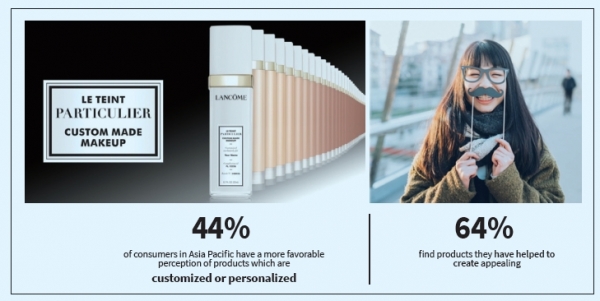
According to the Health and Welfare Ministry’s comprehensive development plan for the cosmetics industry in December 20176, the following are the direction of government policy closely related to customized cosmetics in the R&D section of four major goals along with the vision of leaping to the world’s top three powers.
① The project of cosmetics applying ‘Microbiome‘, among the strategies to ensure the advanced technology of cosmetics through applied research in skin science
② The project of ‘Technology to quantify the skin experience (feeling after using) that can be applied to customized cosmetics‘, among the quality enhancement strategies based on the development of underlying common technology for cosmetics (formula/ evaluation technology/ raw material)
③ The project of ‘Developing beauty services and devices combining the 4th industrial revolution ICT technology‘, among the strategies to pioneer new markets through the development of future-leading technology of the 4th industrial revolution (using IoT, 3D printing and big data) " The 4th industrial revolution is like a tsunam"i 7, as Klaus Schwab said at the 2016 World Economic Forum, we can feel the strong winds of the 4th industrial revolution also in the cosmetics industry8.
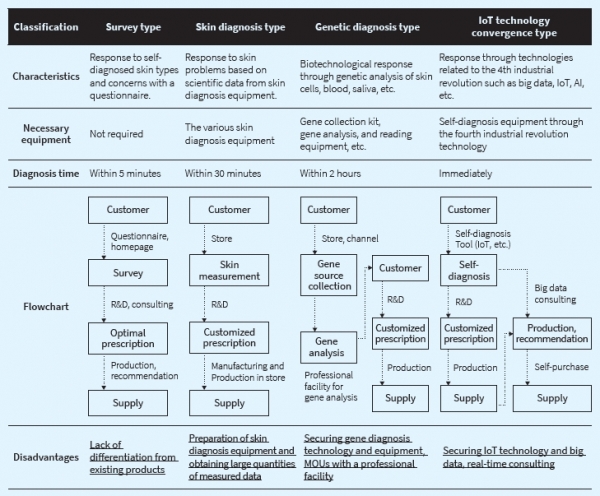
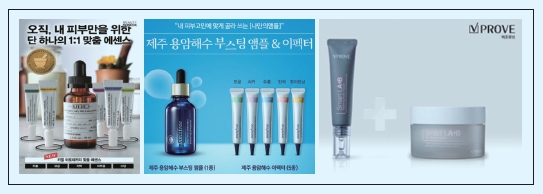
Like functional cosmetics which has been first introduced with the implementation of the Cosmetics Act of 2000, the customized cosmetics regulations will be enforced in March 2020; however various customized
cosmetics have been already on the market. These are summarized in the following 4 different models:
In the case of the survey-type customized cosmetics (1st-generation type), skin diagnosis is performed by questionnaire. This is a model that presents cosmetics already prepared for customers in accordance with the type of skin or concerns determined after diagnosis. Recently launched Kiehl’s 'Apothecary customized essence' (2017), Innisfree ' Jeju lava seawater boosting ampoule & effector' (2017), Cosmocos ' Smart LAB' line, the customized skin care products that can be used in combination with cream and ampoules according to the individual skin condition, etc. can be examples.
The skin diagnosis-type customized cosmetics (2nd-generation type) utilize the skin measurement system with the equipment that can diagnose the skin. In 2017, many Korean cosmetics companies, including Big 2 (Amorepacific, and LG Household & Health Care) competitively entered into the customized cosmetics market.

In overseas countries, the Swiss Ikari Cosmetics (www. ikariskinexperts.com/en/), German Cosmoded Medical Beauty (www.istcream.de/ enlisch/overview/) and French Ioma (www.ioma-paris.com/en-eu/) provide the service of manufacturing products directly on site using factories or Smart Factory after skin diagnosis.
The genetic diagnosis-type customized cosmetics (3rd-generation) is biocustomized cosmetics based on genetic analysis. According to the MIT report, there are 2 events9 that have made revolutionary changes in the history of biotechnology development during 60 years: ① Announcement of DNA double helix structure in 1953, ② Presentation of human DNA sequences in 2003 faster than expected, which is due to competition for human genome analysis between the 6 counties-collaborative research team and Celera Genomics between 2000 and 2001. The third innovative technology is that the cost of gene analysis is decreasing at a faster rate than Moore' s law10, approaching the recent psychological theshold cost of $1,000.
Japanese Dr. Ci Labo is selling kits (idenshikensa.date/) to analyze ① Collagen metabolism gene (MMP-1 gene) ② Stress metabolic gene (SOD-2 gene, an antioxidant enzyme that removes superoxide which is a kind of active oxygen) ③ Gene filtering harmful substance (GPX-1 gene). Japanese DHC also sells analysis kits to test skin aging genes like Dr. Ci Labo (global.rakuten.com/ko/store/ dhcshop/item/8000040050/). Besides, the UK DNA beauty lab ' Geneu' develops and serves anti-aging serums customized for individual DNA.
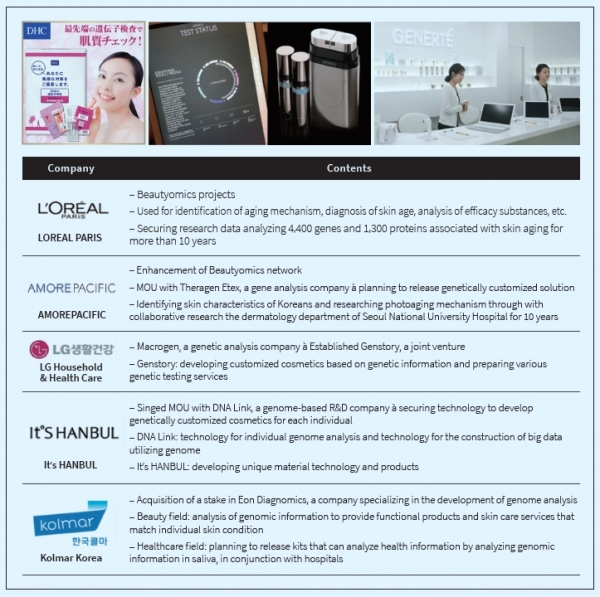
In Korea, it is also reported that genetic information technology is actively working as a new growth engine, as it meets with the cosmetics industry. In 2016, bio-venture Geno Hill has launched ' G2CELL' , a customized skincare brand performing genetic analysis on the basis of its experience in gene analysis research. Hankook cosmetics introduced its customized product ' Generte' in 2017. Also, Amorepacific, and LG Household & Health Care, It' s Hanbul, Kolmar Korea, etc. collaborate with genetic analysis facilities to carry out projects or establish joint ventures to prepare genetically customized cosmetics.
Since the World Economic Forum in 2016, it seems that everything that always happens around us is within the ' the 4th industry' . So, there is even a sense of duty to have a relationship/connection with them.
At the pan-government level, ministries and the 4th industrial revolution committee collaborated to finalize/announce response plans for the 4th industrial revolution11.
Recently, the cosmetics policy division, biopharmaceuticals and herbal medicine bureau in MFDS has announced the ‘regulatory direction of the 4th industry and cosmetics industry‘, and emphasized that “DIY cosmetics and mixing equipment customized by genetic diagnosis or skin diagnosis, and automation and standardization (smart factory) of processes/records using AI/IoT will be at the center of innovation and become a big framework for future cosmetics manufacturing”. For the 4th-generation cosmetics, the use of big data, the use of IoT technology that connects cosmetics/beauty with a smartphone and other objects, and the way that users can share more information they need in a short time and feel real satisfaction are the key issues.
Samsung Electronics' C Lab has selected 'S-Skin'12, a solution that provides customized skin care at the professional level as the first of its outstanding projects to attend 'CES 2017'. Smart Skincare Solution's letter 'S' and the word 'Skin' have been combined to make the word S-Skin. This device combines two functions of 'measurement and management'. The C Lab also selected 'Lumini', a new concept beauty solution that recommends cosmetics13, in addition to S-Skin. 'Lumini' measures the inside of the user's skin through the light passing through the device. Therefore, it even predicts skin troubles invisible from the outside and shows the results with a smartphone application. It takes only 10 seconds for measurement and analysis, but the results are known to be surprising. Unlike 'S-Skin', which plays a role in giving skin care solutions, 'Lumini' can act as a skin doctor because it diagnoses the skin and provides real-time consulting with the results. In 2018, Shiseido also introduced 'Optune', a home skin care system using IoT.14 'Optune' is an IoT skin care system that provides different care daily to the skin environment through its own algorithm based on skin measurement data from a smartphone application and various environmental data collected by Shiseido.
So far, we have divided the customized cosmetics into 4 models and examined each case. Now, all 4 models are being used depending on cosmetics companies and distribution. To join the customized cosmetics businesses expected to expand in the future, the following 4 steps are required.
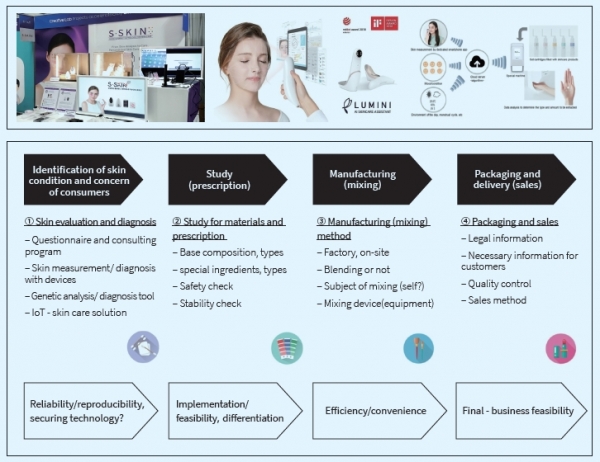
① Skin evaluation and diagnosis steps to understand the skin condition and concern of consumers ② Prescription study step to establish prescription based on skin evaluation and diagnosis ③ Process study step to determine the manufacturing (mixing) method ④ Sales step for final packaging and delivery to customers
At each stage, the acquisition of technologies related to reliability/reproducibility, implementation/feasibility, differentiation, efficiency/convenience, and business feasibility should be considered. Regarding which models are advantageous, cosmetics trends, supply timing, supply target, local conditions, business scale, etc. should be considered together.
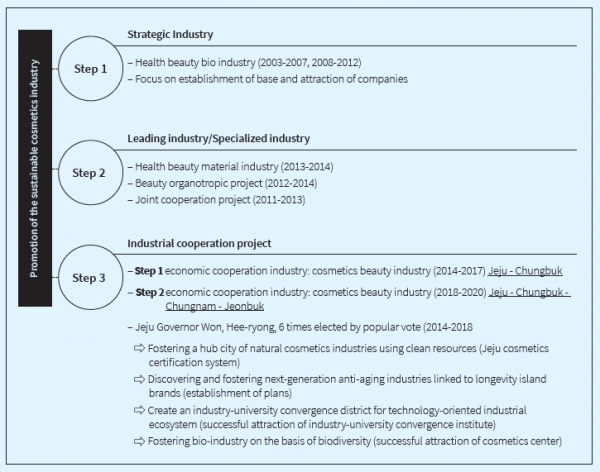
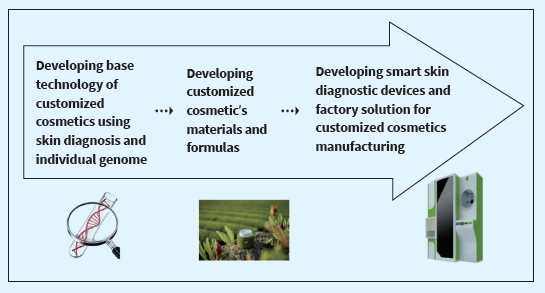
Since 2003, Jeju has steadily fostered the sustainable cosmetics industry through the 1st step (health beauty bio industry) – the 2nd step (health beauty material industry) – the 3rd step (economic cooperation industry).
Besides, recently, Jeju Technopark emphasized that" It is urgent to develop and apply customized cosmetics that can identify the skin characteristics by individual and site, and maximize efficacy/effects" in its report on Jeju National Innovation Cluster R&D related to customized cosmetics.
Jeju won the new business of the 2018 National Innovation Cluster R & D Project, which was implemented by the Ministry of trade industry and energy, to foster Jeju as a regional innovation growth base by linking existing bases such as innovative cities and industrial complexes and promoting innovative projects. This project will be conducted for 3 years as a base technology development project related to customized cosmetics. In addition, study will be conducted on the process research steps to determine ① skin evaluation and diagnosis steps to understand the skin condition and concern of consumers, ② prescription study step to establish prescription based on skin evaluation and diagnosis, and ③ process study step to determine the manufacturing (mixing) method, among the 4 steps to approach customized cosmetics business. Jeju is driving various activities to steadily foster the sustainable cosmetics industry by carrying out non-R&D projects, in addition to national innovation cluster R&D project.
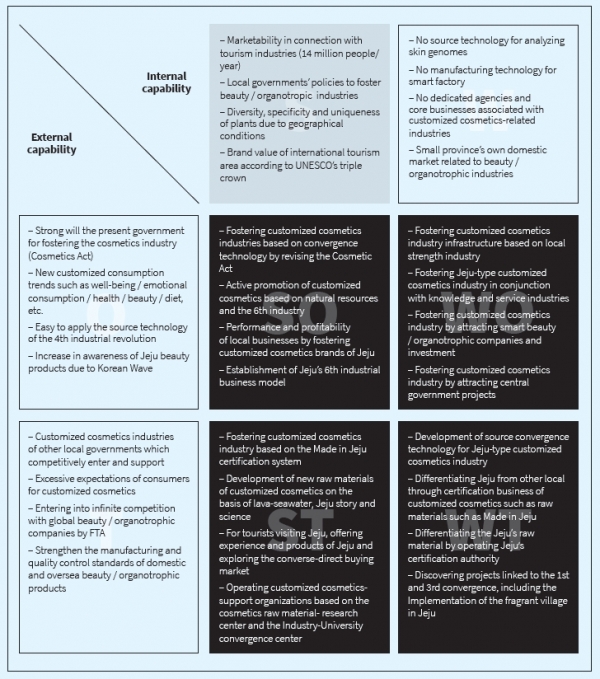
1. MFDS Notification No. 2016-73 (2016.3.11.).
2. The safety management plan for pilot projects of customized cosmetics sales (2016.3).
3. Some propositions of the Cosmetics Act, Final proposed legislation (2017.7.18.).
4. Development status and direction of customized cosmetics, Health aIndustry Technology trends, Fall (2006).
5. Targeting Consumers in Today's Digital Era, Canadean, In-Cosmetics Asia (2016.11.9.).
6. Comprehensive Development Plan for the Cosmetics Industry, the Ministry of Health and Welfare (2017.12.19.).
7. Like artificial intelligence, the 4th industrial revolution comes like a tsunami, Chosun Ilbo (2016.10.19.).
8. Wind of ’the 4th industrial revolutioan’ in the cosmetics industry - the emergence of high-tech services on after another, Joongang Ilbo(2017.8.18.).
9. The era of popularization of biotechnology is here, LG Business Insight (2016.1.20.)
10. An empirical law that the performance of semiconductor integrated circuit doubles every 18months, announced by Gordon Moore, the cofounder of Intel, in 1965.
11. "With the implementation of people-centered 4th industry, where everyone participates and everyone enjoys, solve the social problems and achieve the economic growth at the same time!", Government joint press release (2017.11.29).
12. C lab’s outstanding project, CES 2017 debut- S-Skin, a skin specialist in my hand, Samsung Newsroom (2016.12.26).
13. C lab’s outstanding project, CES 2017 debut- Lumini, a new concept beauty solution that recommends cosmetics, Samsung Newsroom (2016.12.27).
14. Shiseido’s Personalised Skincare System, Stylus (2018.02.13.).

